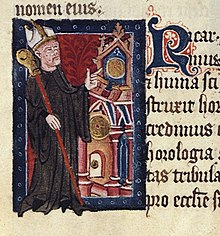On the Foundation of the Monastic Life: The Abbot
What Sort of Man Ought the Abbot to Be
9 Jan, 10 May, 9 Sept
An Abbot who is worthy to preside over a monastery ought ever to remember what he is called and to fulfill with his deeds the title of superior. For it is believed he acts in the place of Christ in the monastery, since he is called by His title. For the Apostle writes: You have received the spirit of the adoption of sons, in which we cry: Abba, Father. And thus the Abbot ought never to teach, institute, or command anything that is outside the precept of the Lord. Rather, let his command or doctrine be a leaven of divine justice strewn into the minds of the disciples.
On the Foundation of the Monastic Life: The Abbot
By Blessed Ildephonse Cardinal Schuster
1. ‘The Abbot who has been judged worthy to govern the monastery should reflect well on his title and show himself such above all in his works. For faith makes us see in him the vicar of Christ; such that he assumes His very name, as the Apostle says: “You have received the Spirit of adoptive sons, Who puts on our lips the invocation: Father, Father.” Therefore the Abbot should teach or order nothing besides the Precept of the Lord; but rather, his command and his teaching should be like leaven of divine justice which penetrates into the mind of his disciples.’ (Rule, Chapter 2)
***
2. The atmosphere of the Benedictine cenobium ought to be supernatural: where everything ought to be regarded with the eye of Faith. Saint Benedict begins to describe its foundation, which is the abbot. Where there was no Abbot, or where he did not govern, there would no longer be Benedictine life: militans sub Regula, vel Abbate (Ibid., Chapter 1, ‘Doing military service under a Rule, or an Abbot’).
As at the Mass the action of the Priest renders the Sacrifice lawful, so the direction and the prayer of the Abbot are what consecrate to God the daily immolation of the monk. Without this will of the Abbot, even the holiest acts of the cenobite praesumptioni deputabitur et vanae gloriae, non mercedi (Rule, Chapter 49: ‘shall be ascribed to presumption and vainglory, not to reward’).
The Law does not tolerate that the sacrifice should be fed and consumed with profane fire: [it must be] a sacred place and sacred fire.
***
3. In order to define the office of the Abbot, the Cassinese Patriarch [Saint Benedict] derives his concept from the teaching of the ancient Fathers and in the light of Faith. He writes therefore a word which should be seriously meditated upon: creditur [is believed]. We believe it, because Faith teaches us that in the monastic family he occupies the post of Christ and maintains His place.
The government of the Church is founded chiefly on the principle of authority; power derives from on high and not from below, as in democratic and republican governments. Spiritual fatherhood does not have a temporary character, but is perpetual. The Benedictine order conforms to this Catholic tradition. The Abbot in the monastery holds the place of Christ and carries out His offices of father, of master [i.e., teacher], of official intercessor. It is for this reason that Saint Benedict attributes a great importance to the prayer of the Abbot.
It is noteworthy in particular that when the little boy Saint Placid was floundering among the currents and about to drown in the lake of the Neronian Villa, which is therefore called Sub-lacum [i.e., ‘below the lake’, whence Subiaco], it seemed to him that he saw the mantle of his Abbot who was hastening to his aid.
So may Saint Benedict cover us all and protect us under his mantle!

